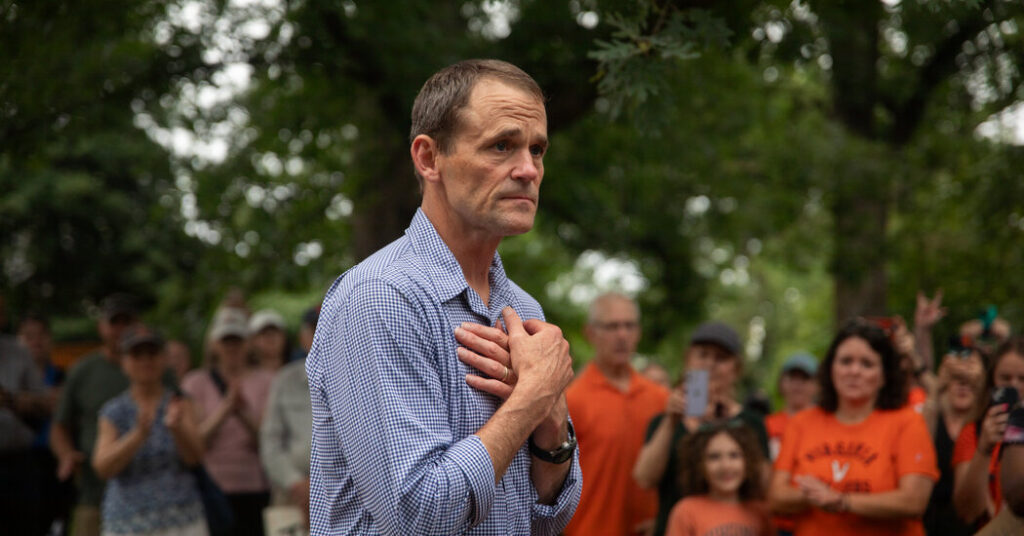The former president of the University of Virginia, in his most expansive statement since he resigned in June, described in a letter to the faculty on Friday the immense pressure the Justice Department had directed at him and the school in his final days in the position and said that his ouster had been publicly mischaracterized.
In an extraordinary 12-page letter, the former president, James E. Ryan, said the school’s board had been unwilling to take on the Trump administration and had essentially traded his resignation for a deal to spare the school investigations and fines.
The Justice Department has said it never told the school to oust Mr. Ryan. The school’s board, however, has said that the department wanted him to step aside. Mr. Ryan said in the letter that on June 26, a member of the board and two lawyers for the university told him that, following a call with a top Justice Department official, he had four hours to resign, or severe punitive measures would be leveled against the school by the Trump administration.
“The call for my resignation, right until the end, seemed so outlandish as not to be entirely believable,” Mr. Ryan said. “It also felt like a hostage situation, where the kidnapper threatens harm if you do not keep information about the demands confidential. I was repeatedly told to keep this threat confidential and scolded for sharing the information with some close colleagues to help me think through the best path.”
Mr. Ryan added: “I worried that if I went public, U.Va. would lose funding and get attacked by the Trump administration, and I would still end up being fired or forced to resign regardless.”
The letter from Mr. Ryan is likely to inflame tensions in Virginia around the school’s deal with the Trump administration, which was announced last month and has become a major political issue in the state. Democrats have characterized it as an act of capitulation, the school’s board has claimed that it protects academic freedom and conservatives have praised the ouster of Mr. Ryan.
On Wednesday, Virginia’s governor-elect, Abigail Spanberger, asked the board to put off choosing a successor until after she takes office. The current governor, Glenn Youngkin, has criticized Ms. Spanberger for trying to interfere in the school’s matters before she takes over and said that she does not have a full understanding of the Justice Department’s deal with the school.
A top official in Governor Youngkin’s office said that throughout the entire negotiations it had been of “the utmost importance” to the governor that the school be in compliance with the Justice Department’s view of federal civil rights law, and protect its federal funding. The official added that members of the school’s board had ultimately lost faith that Mr. Ryan could accomplish that.
Spokesmen for the Justice Department and the University of Virginia did not respond to messages seeking comment about Mr. Ryan’s letter.
In the letter, Mr. Ryan described in detail how the Trump Justice Department had ramped up its pressure on the University of Virginia earlier this year, at the same time that it was waging a wide-ranging campaign against Harvard University that threatened its federal funding, ability to enroll foreign students and accreditation. The Justice Department said it was investigating Harvard’s diversity, equity and inclusion policies and whether it was complying with federal law and judicial rulings.
While the administration was moving on that front against Harvard, two top Justice Department lawyers who were also University of Virginia alumni took the lead in dealing with the school. One of them was Harmeet Dhillon, the head of the civil rights division.
Mr. Ryan says it all came to a head on a Thursday in late June. The New York Times had just reported that the Justice Department was pressuring Mr. Ryan to step down as a condition for resolving a range of issues with the school, including investigations. Mr. Ryan said he had been told he had to resign within four hours or “D.O.J. would basically rain hell on U.Va.”
“If I did not resign that day, I was told that the D.O.J. would extract/block hundreds of millions of dollars from U.Va. before they would even negotiate. I was then told that the D.O.J. had offered an amazing deal — unlike any the lawyers had ever seen, in their words,” said Mr. Ryan, who said he never spoke directly to anyone from the department.
Mr. Ryan said he was told that if he resigned the school would essentially be spared.
“They were basically willing to grant U.Va. blanket immunity — all of the inquiries and investigations would be suspended, no financial penalties would be imposed and agencies would be told not to cut off our research funding,” Mr. Ryan said.
The school’s lawyers told him that “they said they had never seen or heard about such a great deal for any university.”
Given that choice, Mr. Ryan said, he decided to spare the school hardship and step aside.
“If the D.O.J. was sincerely threatening U.Va. if I did not resign, I think it’s important to recognize that presented a difficult choice.”
Mr. Ryan then raised a question about “whether the threat was real, or whether the idea came from the board members who spoke with the Justice Department lawyers, our own lawyers, the governor or some combination of that group.”
Mr. Ryan said that Ms. Dhillon had “emphatically and publicly stated, twice, that neither she nor her D.O.J. colleagues demanded my resignation or offered some sort of quid pro quo.”
That claim, Mr. Ryan said, was not consistent with what he had been told by the school’s board members.
“But I was never in the room when these conversations took place,” Mr. Ryan said. “Given the contradictory statements, someone is obviously not telling the truth, and it’s not clear to me what incentive Harmeet would have to be dishonest about this.”
Mr. Ryan pointed out that “it’s not as if the Trump administration has been shy about calling for resignations.”
“Forcing university presidents to resign, moreover, has not been part of the playbook of the Trump administration; as far as I know, I am the only university president in the country who has been forced to resign as part of a supposed deal with the Trump administration,” Mr. Ryan said. “At the very least, we had board members who were apparently more complicit than other universities.”
Michael S. Schmidt is an investigative reporter for The Times covering Washington. His work focuses on tracking and explaining high-profile federal investigations.
The post Former U.Va. President Details Justice Department Pressure That Led to Ouster appeared first on New York Times.




